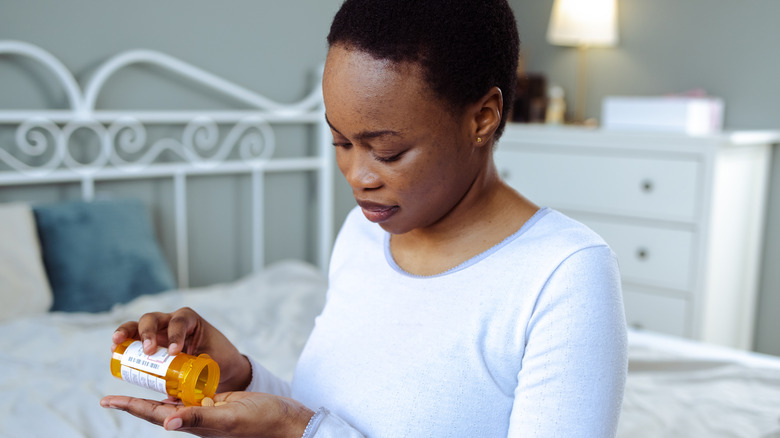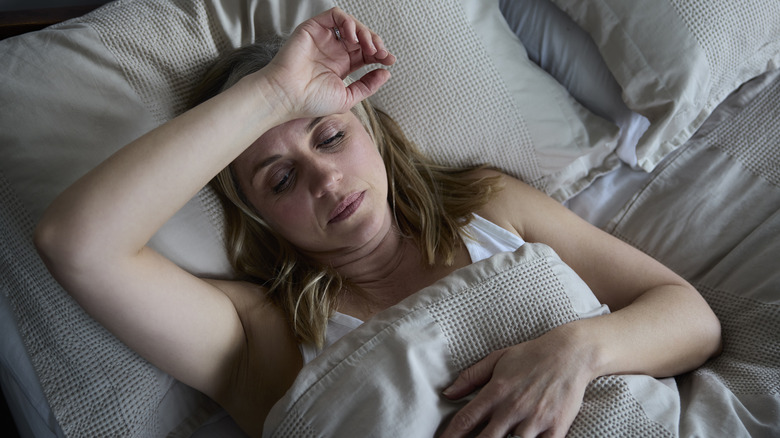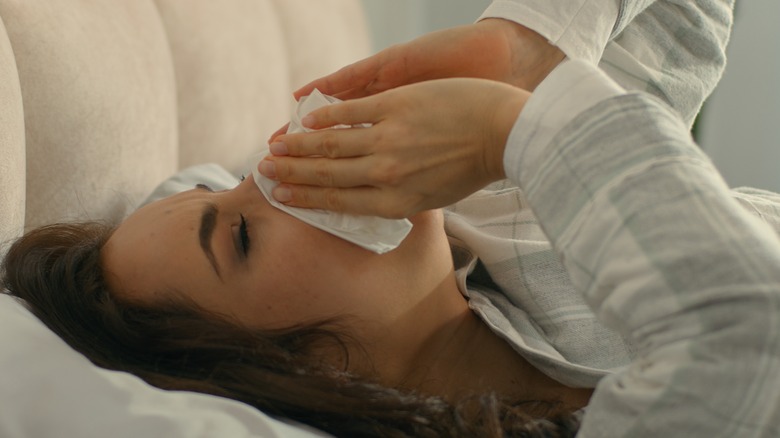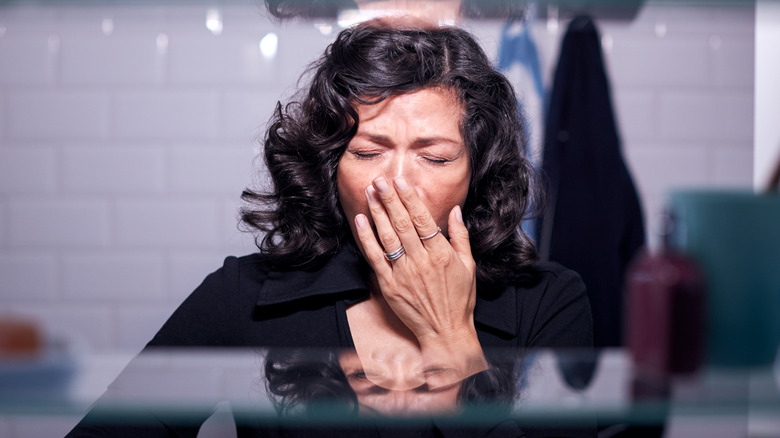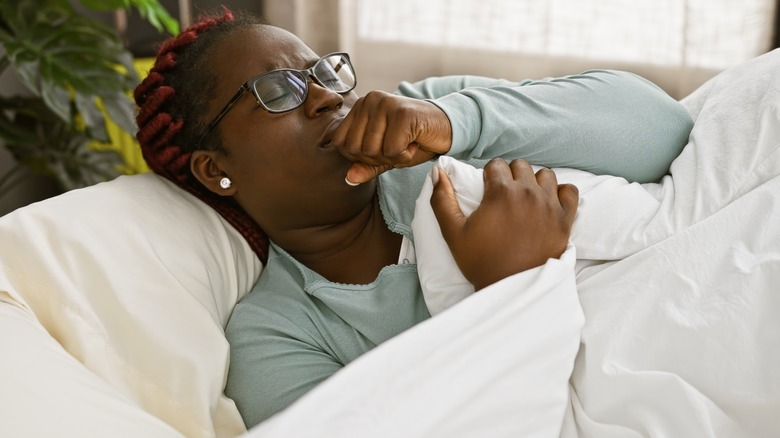9 Medications You Should Avoid Taking Before Going To Sleep
It's no secret that sleep is vital to your health and wellbeing. Failing to get enough rest can have a dramatic effect on the quality of your day in the short term, leaving you exhausted and feeling less than your best self. In the long term, a lack of sleep can have even more significant repercussions and potentially lead to a host of serious health concerns.
This is why it's so crucial to be aware of medications that might interfere with your ability to sleep soundly at night. Some could actually prevent you from falling asleep, which may seem problematic if you absolutely have to take those medications to maintain your health. As it happens, everything from blood pressure drugs to thyroid medicines could be to blame for your lack of shut-eye. If these prescriptions are a part of your everyday routine and you notice you just don't sleep very soundly anymore, your medications could be to blame.
But what do you do when doctor's orders dictate that the medicine is vital to your health? Before you go ringing up your provider to chase down a prescription for insomnia, you should make sure that what you take is actually on the list. The solution may be as simple as taking the medicine earlier in the day, so it's less likely to disrupt your sleep. Here are 10 medications you shouldn't take before you go to sleep.
Beta blockers could make it hard to fall asleep
Beta blockers play an important role in regulating high blood pressure and treating irregular heartbeat by slowing the heart rate, which in turn prevents the heart from being overworked. People may also rely on them if they suffer from chest pains or to prevent circulatory system problems, as the medication expands the width of the arteries and the veins. This allows blood to flow more efficiently and can prevent serious health concerns, such as aneurysms and heart disease.
Unfortunately, beta blockers can also make it difficult for you to fall asleep. Psychiatric clinical pharmacist Jennifer Corapi of the Massachusetts General Hospital explains to Harvard Health, "One side effect is that the medications can decrease the body's natural levels of melatonin, a hormone that helps regulate your sleep-wake cycle. If beta blockers suppress melatonin, you might have trouble falling or staying asleep at night."
What's more, beta blockers may even have an effect on your mental health. Says the Berlin Institute of Health's Reinhold Kreutz, MD, PhD, a professor at the Institute of Clinical Pharmacology and Toxicology, "The possible mental health side effects of beta-blockers have been the subject of discussion in the scientific community for many decades." Those effects include but aren't limited to insomnia and nightmares. In a clinical trial he supervised, Dr. Kreutz explained that "[s]leep-related symptoms such as unusual dreams or insomnia did emerge during beta blocker therapy for some patients."
Decongestants might affect your ability to sleep
When you're stuffy, it's natural to reach for a decongestant to tame the discomfort and help you rest. There's nothing like the sweet relief that comes when you're finally able to take a deep breath, close your eyes, and lie back in anticipation of a good night's sleep — but that's in an ideal world. The truth is that this popular medication can make it difficult to fall asleep.
This often comes as a shock to people who use decongestants. The problem is that it contains a key ingredient (typically referred to as "D" in the name of the drug) called pseudoephedrine, which thins the blood vessels to slow your congestion. However, it also narrows other blood vessels and could increase blood pressure, which could cause you to feel tense and alert, the opposite of what you want to feel when you turn in at night.
J. Russell May, Pharm.D., a pharmacology clinical professor at the University of Georgia College of Pharmacy in Augusta, tells Health Central, "If you have a side effect from the 'D' part, maybe it's going to be a little bit of nervousness or a bit of difficulty falling asleep." Sleep Advisor chief medical advisor, Dr. Raj Dasgupta, M.D., tells ABC News that soup may be a good alternative. "The steam going up your nose is gonna be wonderful. That's one you could do like just really briefly like maybe in the morning or when you get home from work."
Corticosteroids can cause insomnia to flare up
Corticosteroids are used to tame inflammation due to allergies, asthma, and rheumatoid arthritis, among other conditions. They work by slowing your immune system's response to alleviate issues such as redness, swelling, and discomfort. They may be applied topically, taken orally, or even inhaled or injected.
Research has found that taking some of these corticosteroids late in the day, such as prednisone, cortisone, and dexamethasone, may prevent you from falling asleep. The study revealed that it could be due to a decrease in melatonin production that occurs when the body's natural sleep-wake cycle is disrupted. Andrew Spector, MD, the associate professor of neurology at Duke University School of Medicine, tells Everyday Health, "Corticosteroids absolutely cause insomnia."
The risk is greater if you take certain corticosteroids for extended periods. Prednisone, for example, has a cortisol-like effect on the body, helping you tolerate stress better and boosting your energy. Taking the drug for too long could disturb your internal body clock by causing a steady increase in insomnia for extended periods. With elevated stress and energy in your body, you're less inclined to sleep soundly. If you absolutely have to take steroids to manage certain symptoms, consider taking them in the morning so that they're less likely to affect your sleep.
Antidepressants can depress your sleep
While antidepressants can be life-changing for many people, some classes of these popular drugs have an adverse effect on sleep quality. That's because they can cause restlessness. Moreover, depressive feelings themselves can make it difficult to fall asleep, making it doubly challenging for people experiencing mental health concerns to get the rest they need to feel their best.
Taking antidepressants, then, may feel like a double-edged sword to many people. Some of these medications may even have more of a sedative effect on some patients, which is why it's so crucial to have a conversation with your doctor about the right choice for your unique needs — especially if you typically have issues falling asleep. A study published in the International Journal of Molecular Sciences found that some kinds of antidepressants "activate" the brain instead of sedating it. Among those are selective serotonin reuptake inhibitors (SSRIs), serotonin and norepinephrine reuptake inhibitors (SNRIs), and norepinephrine-dopamine inhibitors (NDRIs).
Dieter Riemann, the head of clinical psychophysiology at the Freiburg University Medical Centre, tells Reader's Digest India, "You shouldn't take these drugs at night. Take them in the morning so that there's not so much effect on sleep." Alternately, or if you still can't sleep even after changing your schedule, ask your doctor about prescribing something to treat your insomnia.
Diuretics might make it tough to fall asleep
People with high blood pressure, liver disease, kidney disease, or heart failure may rely on diuretics to flush salt and water from the body. These are powerful medications that help the kidneys remove the excess fluid buildup in the body. Allowing fluid to accumulate could increase pressure on arterial walls and veins, causing blood pressure to spike.
There are different types of diuretics, and doctors choose the best option based on your particular medical needs. For example, someone with high blood pressure may benefit from a medication that contains both a diuretic and a hypertension drug. Some people may need a diuretic that spares potassium to prevent blood potassium levels from dropping too low, as this could cause irregular heartbeat. While it's clear that they help tremendously, these medications can affect your ability to fall asleep. Explains Jennifer Corapi, a psychiatric clinical pharmacist at the Massachusetts General Hospital, to Harvard Health, "Diuretics don't affect sleep directly, but they can interrupt sleep if they make you go to the bathroom during the night."
Luckily, the solution to this problem may be as simple as taking your diuretic pill in the morning instead of at night. The earlier that you take it, the less likely it is that you will find yourself up at night going to the bathroom in the dark. If you need to take more than one dose, though, make sure that you take it by 4 p.m. to prevent late nights.
Stimulants will keep you up at night
As the name suggests, stimulants are stimulating — and that can be difficult to handle if you're trying to get some shut-eye. That's because these substances are formulated to make you feel more alert, which is precisely what you don't want to be when you lie down at night. People take stimulants for a variety of reasons, from staying up all night to study for a big test to getting through a busy period at work without falling asleep.
Unfortunately, these drugs can remain in your system for up to several days after consumption. Sometimes, people who take them over days without getting enough sleep experience a crash effect, which causes them to sleep heavily for long periods. This erratic sleep schedule can leave the mind and body overwhelmed and exhausted, which can have an adverse effect if the primary reason for taking stimulants in the first place was to remain sharp and alert.
"Sleep deprivation is associated with mood changes, decreased attention, decreased ability to concentrate, and sadly, it can affect a student's GPA, explains David Edwards, M.D., a family medicine physician serving Texas Tech Physicians, to the Texas Tech University Health Sciences Center Daily Dose. "Study drugs are often in the amphetamine or methamphetamine family, so it's essentially like taking speed. There's really no good antidote for that to help try to sleep other than to let the drug wear itself out of the system."
Cholinesterase inhibitors for cognitive health may promote insomnia
Cholinesterase inhibitors, including galantamine and donepezil, are prescribed in the treatment of Alzheimer's disease. These drugs help the brain cells communicate more efficiently and for longer periods with each other, as well as stall memory loss. Dr. Andrew Budson of the Boston Healthcare System tells Harvard Health, "They can restore your memory to like it was six to 12 months before, but the drugs can't slow the disease's progression. And you have to keep taking the drug to maintain that advantage."
While this powerful medication can go a long way toward preserving some cognitive function for some patients, it can also increase the risk of developing serious sleep health issues. "A classic side effect of donepezil is nightmares, which we solve by just giving donepezil in the morning," Andrew Spector, M.D., associate professor of neurology at the Duke University School of Medicine, explains to Everyday Health.
What's more, about one in every four individuals who have "mild to moderate" dementia and one in every two people diagnosed with "severe" dementia experience disturbed sleep (via Mayo Clinic). Doctors may recommend that patients on cholinesterase inhibitors who continue to have trouble sleeping take melatonin, a natural hormone that may make it easier to rest at night. It's also important to create a schedule where napping during the day is discouraged or limited. This may help regulate the sleep-wake cycle for patients on medication experiencing disturbed sleep.
Nicotine replacement therapy may make it tough to sleep
While nicotine replacement therapy is an excellent option for people who want to quit smoking cigarettes and vaping, it can have an unfortunate effect on sleep. The reason this happens is for the very same reason that nicotine itself has such a negative impact on sleep quality. It has a stimulating effect, and studies have found that the substance can affect sleeping habits even more than caffeine and alcohol consumption.
For many people, nicotine replacement therapy is the most suitable treatment for curbing the habit. The way this treatment works is by replacing the heavier dose of nicotine users normally intake with a lower dose, and without the damaging chemicals that are responsible for health concerns like cancer. The downside is that even this decreased dose of nicotine can have a disruptive effect on sleep, whether the therapy is administered via a patch or consumed through chewing gum or lozenges. "When people quit," says Amanda Holm, M.P.H., a tobacco treatment manager at Henry Ford Health, "they're dealing with the withdrawal symptoms at night, too, which can keep them awake. Plus, some of the medications prescribed to aid with smoking cessation can give people vivid dreams."
Both side effects are more common among people who wear a 24-hour nicotine patch (via the American Cancer Society). Luckily, they may resolve after several days of starting nicotine replacement therapy. If that's not the case, you might consider switching from a 24-hour patch to a 16-hour patch.
Thyroid medications can disrupt sleep quality
Millions of people take thyroid hormone replacements to reverse the symptoms associated with an underactive thyroid. The most common is levothyroxine, a synthetic drug that replaces the lacking thyroid hormone but could potentially cause symptoms of insomnia. That's largely because it boosts metabolic activity and has a stimulating effect, which is a key reason why doctors recommend taking it in the morning. In fact, Dr. Fred Pescatore, M.D., tells First for Women, "The drug can produce headaches, rashes, and sleep problems that can leave women even more drained than they were before."
While trouble sleeping is a common side effect, it's often caused by taking a larger dose than is necessary. Doctors can adjust the dosage based on how your body responds to the levothyroxine, along with the severity of your side effects. Generally, the body should grow accustomed to the changes that affect sleep after you take levothyroxine for a while and your body acclimates to the medication.
Although levothyroxine is the standard course of treatment for hypothyroidism, some people may opt for an alternative if their sleep side effects are too disruptive. Your medical provider can determine the best solution. Adopting natural remedies to problems associated with underactive thyroid may be helpful, too, but only your doctor can provide you with the right treatment plan based on your unique needs.
Respiratory medications may suppress your sleep
Medications commonly prescribed for conditions such as chronic obstructive pulmonary disease (COPD) and asthma may improve breathing, but can have an adverse effect on your ability to sleep. Symptoms like an elevated heart rate and increased nerves can both make it tough to drift off at night. Unfortunately, for many people, the only way to find relief from their symptoms is to take the medicine every day.
Among the most commonly prescribed drugs are prednisone and albuterol, both of which can cause users to wake up more often in the night (via Johns Hopkins). If these common prescriptions aren't effective in treating your symptoms, your doctor may prescribe a medication called theophylline. This works by reducing lung inflammation, which is responsible for aggravating the symptoms of asthma and COPD. While effective in many cases from that standpoint, it can also have an unfortunate stimulating effect on the mind and body. You may feel restless or irritable, or have difficulty sleeping soundly through the night.
Research has found that for patients who have COPD, taking melatonin could be an effective solution to improve sleep without affecting respiratory function (via the Journal of Clinical Sleep Medicine). People with asthma who experience disturbed sleep could benefit from reducing caffeine intake, taking medication in the morning, and regulating the room temperature to promote more comfortable breathing.
